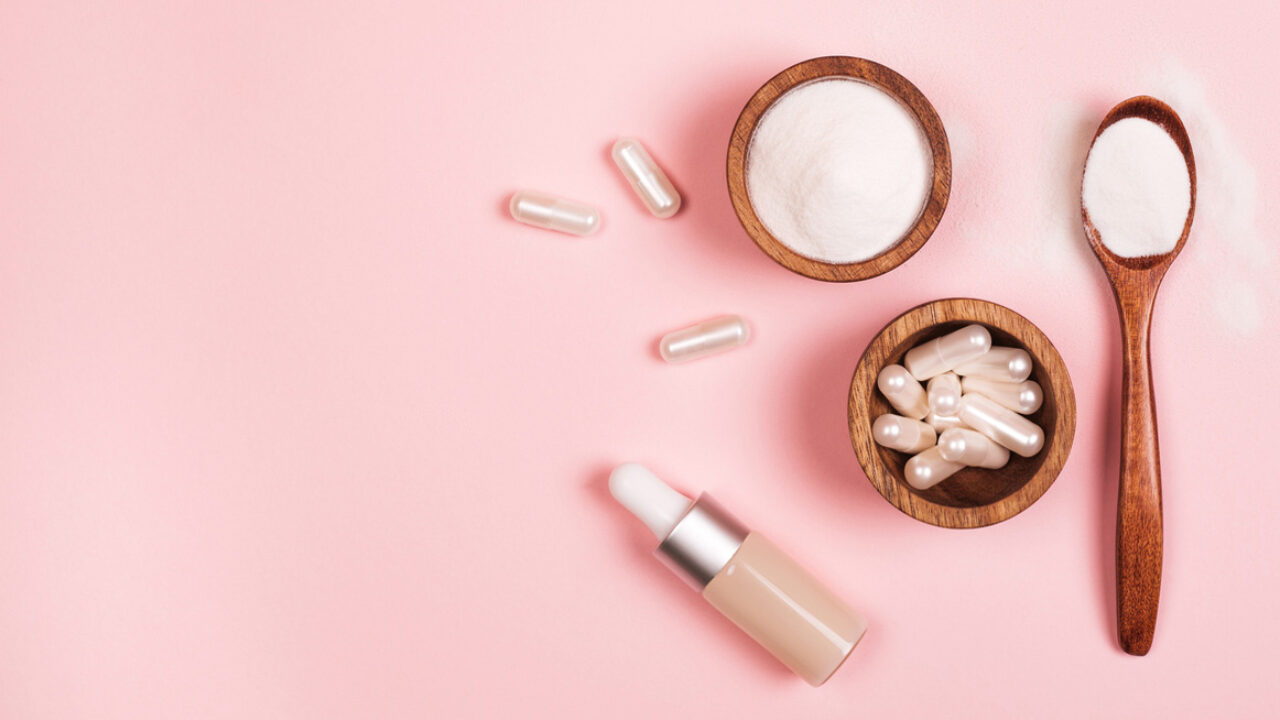
Collagen has become one of those beauty buzzwords that is seemingly everywhere, but few of us will actually know exactly what it is. Nor do we know what the different types of collagen do for our skin.
This is because answering these questions isn’t as straightforward as it seems. It depends on myriad things.
So, to help you get to grips and understand whether or not you want to be drinking, “eating” or applying collagen directly to your face, we’ve hopefully made things a little clearer below.
FURTHER READING: How to prevent wrinkles, according to the experts – and why your phone may be making you look old
In the Oxford Dictionary, collagen is described as being “found in skin and bone, sometimes injected into the body, especially the face, to improve its appearance.” This is vague, to say the least.
Collagen is a protein found naturally in our bodies. It’s a building block for bones, skin, muscles, tendons and it’s also found in other parts of the body like blood vessels and teeth. You can think of it like scaffolding.
When we’re young, collagen makes up a huge part of the structure of our skin. As much as 75%, and it’s found in the dermis (or second) layer. It gives youthful skin its plump and smooth texture and keeps everything from sagging, creasing, and wrinkling.
As we hit the age of 25, these levels start dropping at a rate of 1.5% a year. After the age of 45, our levels fall as much as 30%.
To counteract this drop, there are various ways to introduce more collagen to our bodies – one includes drinking gin! – and we explain more about those a little further down. Before we get to that though, we should explain that not all collagen is created equal.
FURTHER READING: How your skin changes in each decade of your life – and what to do about it
There are four types of collagen found in the body. These are:
In addition to the drop in levels as we age, we also produce lower-quality collagen as we get older. This means the little we have left doesn’t work as well. This manifests itself most visibly in our skin, making it look less bouncy, supple, and firm.
FURTHER READING: The best The Ordinary products for all your skincare concerns – from large pores to redness, wrinkles and acne
To stem the tide of the collagen we lose as we get older, you can boost collagen levels through a variety of means. This includes:
On the flip side, there are also a number of ways to inadvertently decrease your collagen too. These include getting too much sunshine – both UVA and UVB rays can damage the skin and reduce collagen.
Specifically, it damages the elastin in the skin, which increases the signs of ageing like wrinkles and fine lines. Not only can sun damage collagen but other behaviours such as eating excessive amounts of sugar and smoking play a role. You can read more about this in our What is SPF and why is it so important? guide.
FURTHER READING: What SPF do I need? The best moisturisers with SPF, from Supergoop’s Unseen Sunscreen to Heliocare 360
One of the best ways to increase collagen is via your diet. To help your body increase collagen, it starts with the formation of procollagen, and this combines two amino acids – glycine and proline. This process uses Vitamin C. Here are some great collagen-rich foods that you can eat to increase collagen.
Vitamin C: Large amounts are found in citrus fruits including lemons, and oranges as well as grapefruit and strawberries. Vitamin C comes with a lot of benefits so it’s worth adding more to your diet anyway. You can read more about this in our skin food guide, or our Vitamin C Ingredient Spotlight.
Proline: Proline is found in egg whites, dairy products, cabbage, asparagus, and mushrooms.
Glycine: This can be found in pork skin, chicken skin, and gelatin.
Copper: This is found in sesame seeds, cocoa powder, cashews, and lentils. Particularly good sources are oysters, nuts, shitake mushrooms, lobster, liver, leafy greens and dark chocolate.
FURTHER READING: Skin food: The best foods for clear, healthy skin – and why they work
Collagen supplements come in the form of liquids, capsules, tablets, pills, powders and shots.
Taking it with liquid, or mixed into a drink, means it absorbs into the bloodstream faster than tablets, for example. Liquid collagen plays a little trick on your body and its natural collagen production, making it become more active over time.
Collagen supplements are called ‘hydrolysed’ in the supplement world and this describes a form of collagen that has been broken down, making it easier for our bodies to absorb. The broken-down protein can travel throughout the body – to the skin but also the hair and so on – to help support the body’s natural collagen production.
FURTHER READING: The truth about beauty supplements: Do they work and which ones should you take?
Bear in mind though that the collagen is broken down as part of the digestion process, so you won’t get all of a supplement going directly to your skin. It will be dispersed throughout the body.
You also need to take supplements or drinks regularly for the full benefits to be seen. Experts recommend at least eight to nine weeks of continuous use before you’ll see results.
We’re currently in the process of running a big group test which involves scanning our skin using a smart mirror at the start, taking a specific supplement for three months, and then scanning our skin again. Our current trial is of Great Lakes Collagen Hydrolysate, and then we’ll be moving onto Revive Collagen, and then Absolute Collagen (among others).
This may seem like a lot of effort to go for to see if these supplements really work, but we don’t feel comfortable recommending products – certainly ones you’re going to ingest! – unless we’ve actually tried them and seen the difference. You can read more in our guide: How we test skincare to see if it lives up to its claims.
FURTHER READING: Could your phone be prematurely ageing you? Blue light can make wrinkles and fine lines worse
Collagen can also be found in skincare and there is some debate about its effectiveness. Collagen itself is a rather large molecule and this means it doesn’t easily penetrate the upper layers of the skin to reach the dermis. If it doesn’t reach the dermis, it doesn’t boost collagen in the places directly where it’s formed.
That’s not to say that collagen in skincare doesn’t work at all, or manufacturers are being deceptive or similar. It means that the changes are somewhat superficial.
As you can read in our Avon Plumping Shots review – serum capsules which Avon claims will restore ‘seven years of collagen in seven days’ – we did notice a difference in our skin, but it wasn’t substantial.
The skin may feel smooth and soft, and fine lines may look reduced, but these creams – on the whole – won’t help generate more collagen naturally in your body. An improved appearance may be what you’re after, in which case there isn’t any harm. Other than maybe to your bank balance!
FURTHER READING: The science of serums: What is serum and what does serum do?
